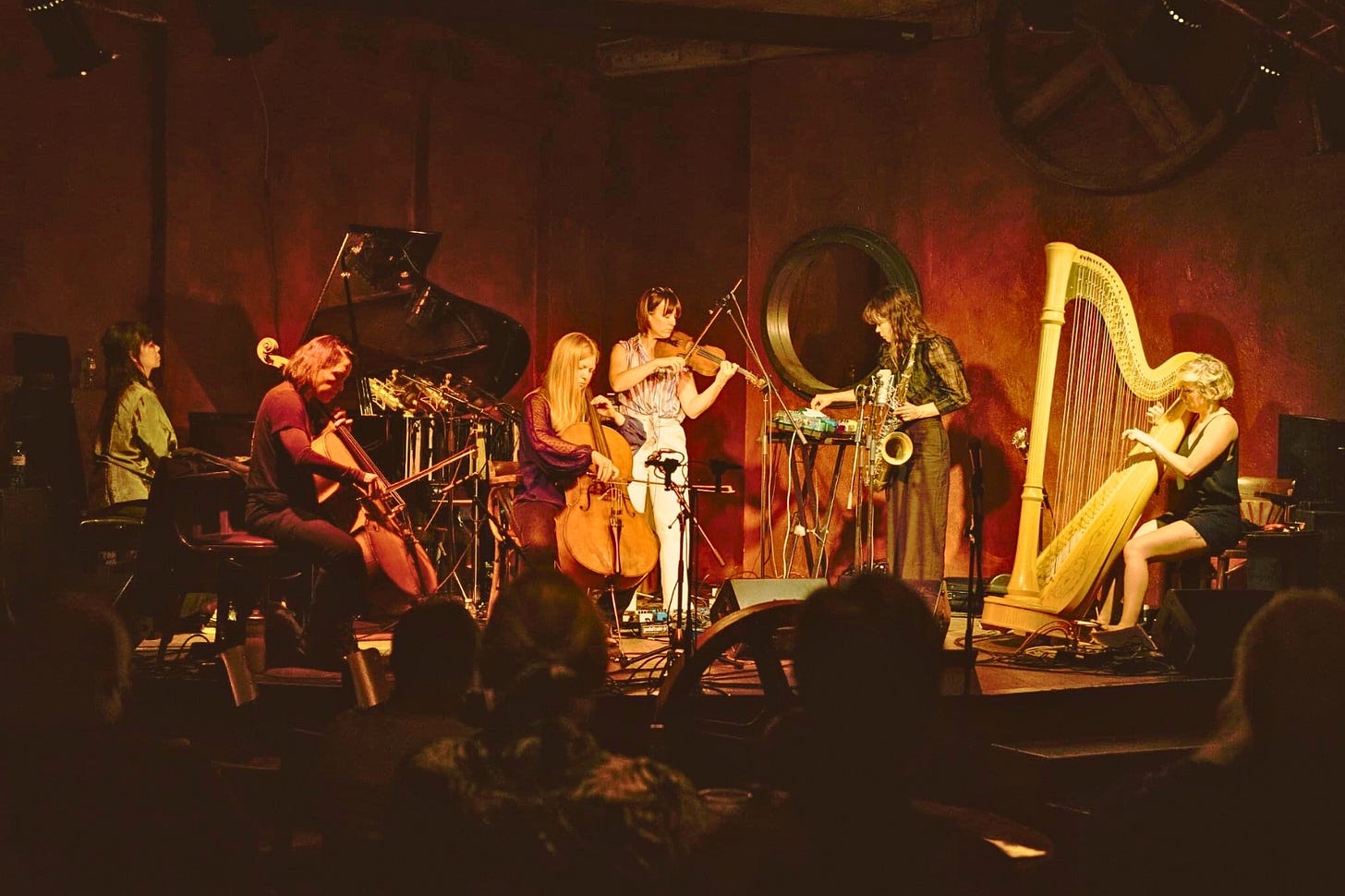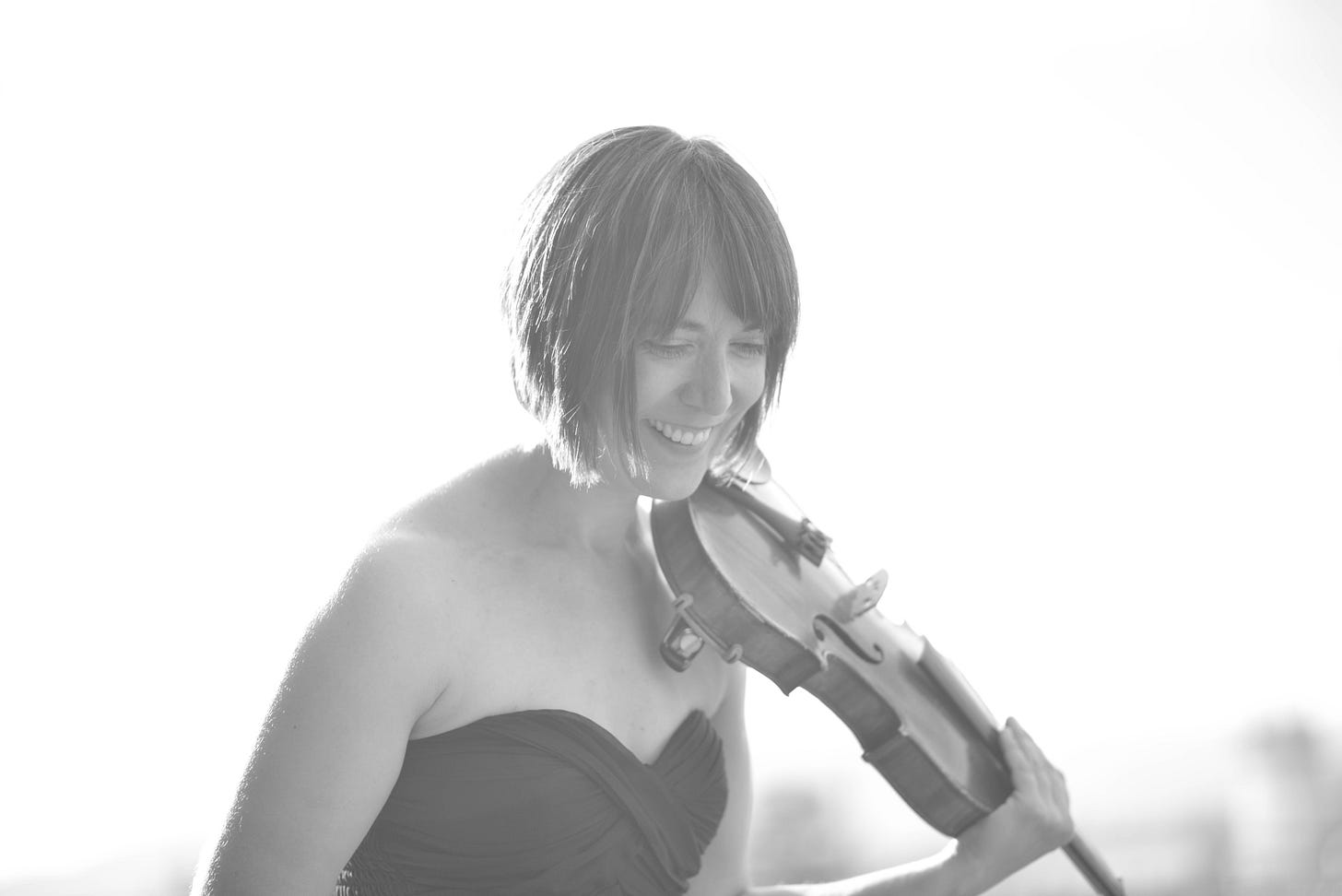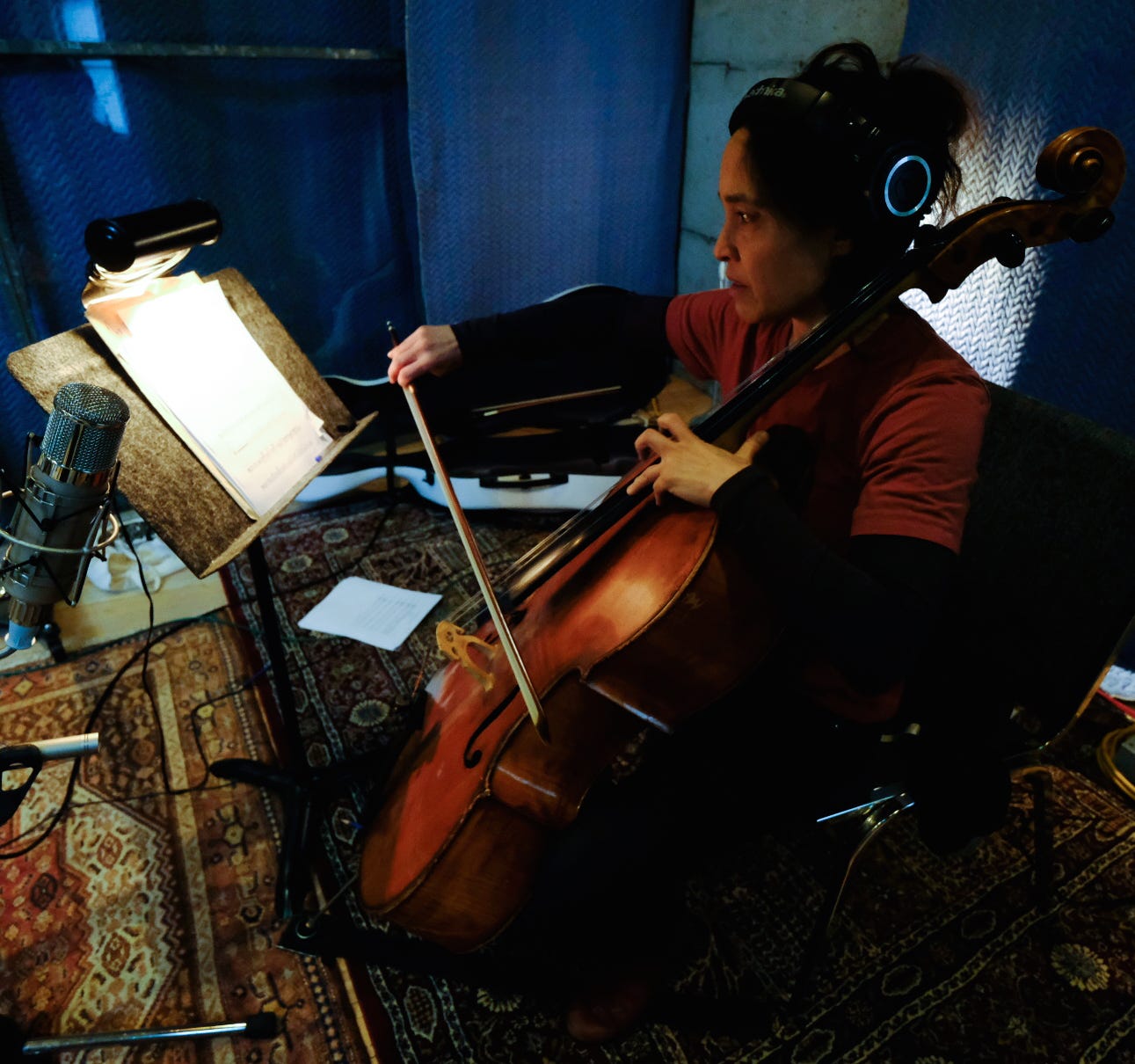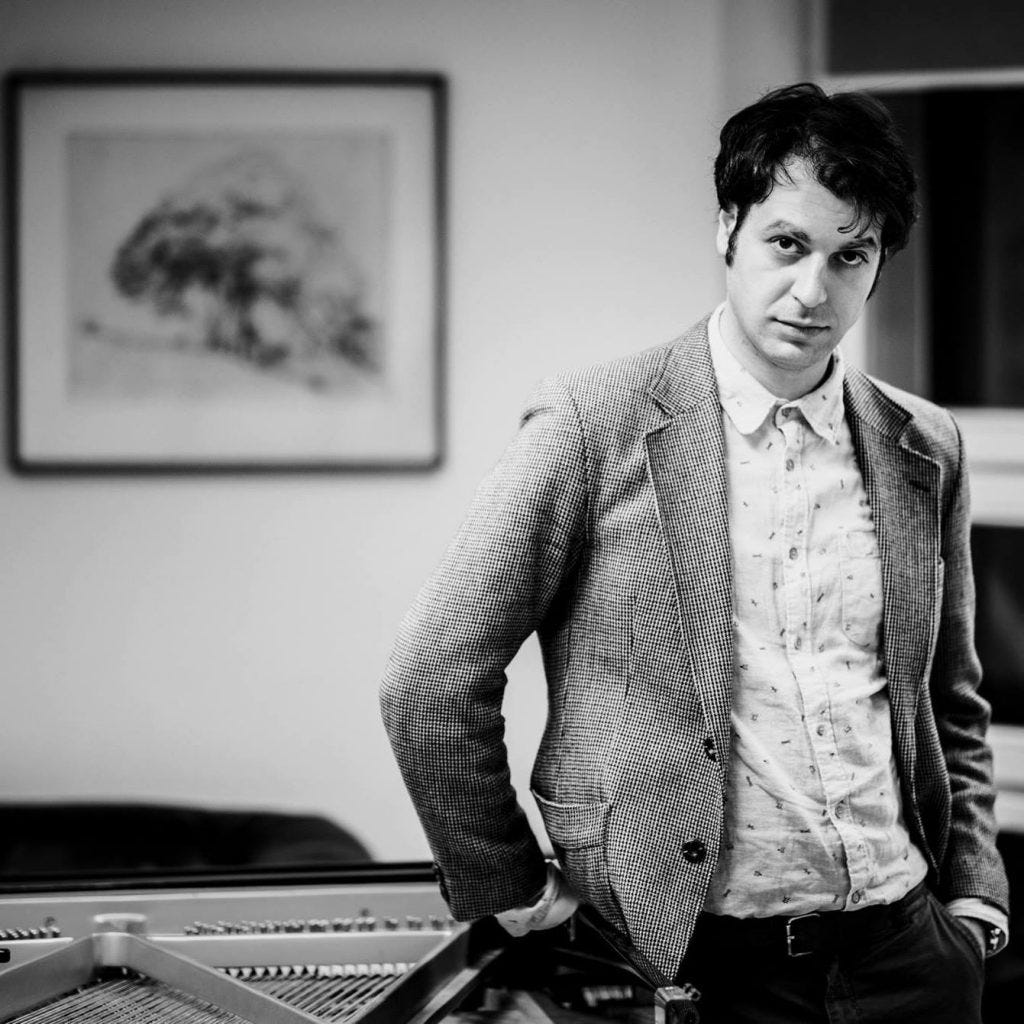Overstuffed in a Land Without Stuffing
Meredith Bates, Peggy Lee, Arash Yazdani, Tarawangsawelas, Flora Yin-Wong
Like the Mind’s Improv-Fueled Ambient Drift
I’m not sure how Like the Mind, a sextet featuring three musicians from Vancouver and another three from Stockholm, first came together in 2019, but the six women in the group have somehow managed to hold it together through the pandemic, performing and recording in both home cities during that period. They’re currently on a short European tour that brings them to Berlin for the first time on Tuesday, November 21 at Kühlspot Social Club. The project is led by Vancouver violinist Meredith Bates, a musician who gamely exists between the cracks of ambient, contemporary music, and free improvisation. I first heard her music earlier this year with the sprawling double album Tesseract (Phonometrograph), which is filled with material that’s luxuriously expansive, forging a billowing, multivalent strain of ambient music where the sound and presence of the violin is nearly always palpable. The difference between acoustic and electronic sounds is occasionally hazy, but that’s beside the point. In the crafty hands of Bates the violin proves to be an excellent sound generator, not simply in terms of its rich timbre, but also through its grain, which she craftily amplifies to create music that goes far deeper than ambient drift.
As you can tell on the piece “Constellation,” below, some pieces impart a clear classical influence, with a dramatic melodic sensibility and tonal purity rippling through the gauzy atmospherics. There are moments when the music flirts with a glossy ambient sensibility, providing hollow calories rather than asking for something from the listener, and both of these qualities exist in this track. The 31-minute “Debris” progresses with leisurely grace, opening with decidedly gritty electronic rumbles before filling with delay-drenched pizzicato patterns on the violin, as constantly morphing criss-cross patterns overlap in endlessly changing fashion. That’s merely the first 10 minutes.
I’m not a huge fan of the overtly ambient stuff—I always need something toothy in my glide—and thankfully Bates shifts modes and changes timbre often enough that I’m never stuck in sonic velveteen for too long. There’s enough stark, abrasive ambiguity to always keep me engaged. Still, in Like the Mind Bates is able to position that proclivity for ephemeral generosity in a context I find far more effective and compelling. At times the sextet has managed to translate the sound of the violinist’s solo work with conventional instruments. The ensemble is superb. Stockholm is represented by the nonchalantly versatile pianist Lisa Ullén—who just performed in town earlier this month in Finn Loxbo’s excellent Kommun, and who will be back in a couple of weeks with Charlotte Hug and Nina DeHeney—along with cellist Emma Augustsson and saxophonist Lisen Rylander Löve, while Bates brings along two Vancouver pals, cellist Peggy Lee and harpist Elisa Thorn. Like its debut album Live at Fylkingen, the group’s newly released second album Walk So Silently is also a live performance, this one at the 2022 edition of the Vancouver Jazz Festival. It’s a single, uninterrupted 58-minute piece where melodies unfold in both jittery spasms and spacious arcs and elegant curlicues, all held aloft by rich swells, fleeting arpeggios, slashing lines, and the occasional flurry of rough-grained texture, visceral counterpoint, and bracing dissonance.
I don’t know how the piece works, technically, or what kind of score Bates wrote, but the ideas never flag, the ensemble calmly moving from one distinct section after another. For long stretches the music basks in lush serenity, while at other times it veers towards febrile free improvisation. If there is score, it’s pretty wide open, affording a gripping dynamism. If the ensemble actually plays the same “piece” here I can’t imagine it will sound remotely the same. You can check out the whole thing below.
It’s impressive that the two cellists in the ensemble not only stay out of one another’s way, but subtly complement one another, occupying their own respective stylistic terrain. Over the last couple of decades Lee has been one of the strongest improvising voices on the instrument, and she’s in the midst of an incredibly fruitful period, including the invaluable contributions she made to the excellent new Darius Jones album fLuXkit Vancouver (it’s suite but scared) (Northern Spy/We Jazz). The group includes several key players from the city—the Zubot Brothers and James Meger, more about them soon!— along with drummer Gerald Cleaver. It’s one of the most powerful recordings Jones has ever made, a suite of music that contains many layers to parse. The more I hear it, the more it’s pulled me in. Lee is also featured—along with Bates—in Josh Zubot Strings, a raucous string quintet with a Charles Mingus-grade drive. Its eponymous album on Drip Audio presents ten extroverted originals marked by loping grooves, slashing lines, and plenty of frenzied soloing within the inexorable flow and tight arrangements. Lee and double bassist Meger obviously hold down the bottom for the trio of violinists (which also includes Josh’s brother Jesse Zubot) who chew up the scenery, evoking many of the stops between Stuff Smith and Billy Bang. Of course, Lee gets to pitch in, too, as you can hear on the shape-shifting “Beach and Car,” below.
A fuller picture of Lee’s talents, especially as composer and arranger, is transmitted on her recent album A Giving Way (Songlines). It was made with her long-running Peggy Lee Band, which formed 25 years, and has maintained the current octet line-up since 2007. Lee deploys dense, richly contrapuntal writing that sets the timbres of brass, strings, and electric guitars into mosaic-like parts, albeit ones frequently on the move. The influence of Charlie Haden’s Liberation Music Orchestra is beautifully apparent in the material, where folk and gospel collide, although the intertwined guitars of Ron Samworth and Tony Wilson can function like a livewire threading the chorale-like glow. There are plenty of solos embedded in these tightly-charted pieces, including totally free interplay. The nine indelible originals are complemented by a lovely take on the Band’s classic “Whispering Pines,” which reflects a kind of formalized Americana (a la Bill Frisell) that pervades much of the album. I mean that as a kind of rough-hewn sonic blueprint that could extend from Stephen Foster to Steve Earle. Either way, it’s a beautiful recording.
It was produced by Lee’s partner Dylan van der Schyffe, who also played drums on it. Arrangements this dense and detailed need space, and there’s an attractively airy room feel across the board. The band includes some serious Vancouver veterans including trumpeter Brad Turner, and the guitarists mentioned above and the meticulous performances reveal a group commitment that’s often missing in more ambitiously scored projects. The melodic generosity ismoving. Below you can check out “Promise,” with its faded soul undertones.
Arash Yazdani’s Sound: Plasma
There’s always so much music happening in Berlin that it’s easy to miss out on stuff. It’s one of the main reasons I started doing this newsletter. The Sound: Plasma Festival had never been on my radar until I noticed the 2023 iteration, which takes place this weekend at Machinenhaus in der Kulturbrauerei. The festival is organized by composer and conductor Arash Yazdani, an Iranian who currently works in Tallinn, Estonia, where the festival began in 2017. It’s been mounted there every year since then, with a Berlin edition in three of the last four years (for obvious reasons, it didn’t occur in 2020). Yazdani is the conductor for Ensemble for New Music Tallinn, which performs on both nights of the festival: each evening is split into two halves. Also performing is the Swiss group Ensemble Vortex, which plays the second set on Friday, November 24, and the international saxophone quartet Ensemble du Bout du Monde, which plays the early set on Saturday, November 25.
All of the programs look strong, but the second night doubles as a release event for a terrific new double CD composer portrait of Yazdani’s music, Propagation of Uncertainty (Kairos). The collection captures the composer’s fascination with and devotion to notes that are close in pitch, unveiling extravagant stretches of acoustic beating both bracing and expansive. I’m still trying to process the more than two hours of music, but some of it immediately sparked my interest. The collection spans over a decade of work, beginning with the 2011 opening piece “Finite Functions of infinitive sets” for four clarinets, which totally riveted me, taking me on deliciously visceral psychoacoustic joyride, especially when the instruments push into the upper register, with piercing overblown tones functioning like sonic weapons. The four instruments coalesce and break apart in new patterns and clusters over its eleven harrowing minutes. This is followed by a 2020 piece for four flutes, “Gā Geriv,” which seems more gentle and serene from the outset, but ultimately explores similar terrain with much different results. As with the clarinet piece, I could spend hours basking in this kind of sonic interference.
Yazdani isn’t precious about his tools. He wrote his 2019 piece “Instruction Manual of How to Learn Stop Worrying and Love the Bomb in 5 Minutes,” which clearly doesn’t sweat punctuation, for four Otamatones, a Japanese synthesizer shaped like an eighth note that was introduced in 2009 as a toy. They sound like tinny, chintzy bassoons with a cheap, chirpy, piercing quality, and Yazdani’s score uses his trusty tight intervals to produce needling long tones and terse polyrhythmic spasms. The palette is a bit ridiculous and playful, but the composer is still able to gamely and humorously pursue this particular strain of microtonal experimentation. Check it out below.
Ensemble for New Music Tallinn will perform this piece on the late program on Saturday, in addition to a brand new work by Yazdani and the 2023 composition “WinterWolf,” an account of which is also included on the new CD. It was written for two electronic keyboards. It’s a deliriously warped assemblage of organ-like lines that gliss out in drunken swerves, fanfare-like phrases, and kaleidoscopic harmonic bursts.
During the first half of Saturday’s program Ensemble du Bout du Monde will perform “Stromateis: ...emergence...,” which they recorded for the album. The cascading lines constantly change shape, dripping in water-like strands that perpetually reconfigure when they splash into one another. I hope I’m not making it sound like this action is random, as Yazdani exercises impressive control and precision on all of these pieces. You can hear it below. The album contains a bunch of other pieces for varied instrumentation, which are no less captivating.
Short Takes on Live Music in Berlin This Week
One of the few musical highlights during a music-deprived year in Rome between 2018-19 was catching a beautifully hypnotic show by the Indonesian duo Tarawangsawelas. The group is named after Tarawangsa, which is both a two-stringed fiddle and a type of Sundanese West Javanese sacred music. The Bandung duo is in Berlin this week to record at Morphine Raum, an increasingly invaluable venue and a trusted recording studio. It’s also a record label, which had released Wanci, my introduction to Tarawangsawelas, some five year ago. They’ll perform on the space on Tuesday, November 21. Wanci still entrances me years later, as the musicians inject experimental sounds into the brew. I’m no authority on music from this region, but what Tarawangsawelas does is both rooted in tradition and also pushes against it. I recall some of the experimental impulses being toned down a touch when I saw them live, but with Morphine’s Rabih Beaini, who produced and played on Wanci, I’m guessing the music could go further out. One track can’t really paint the full picture of the music, but check out the opening track “Selalu,” below.
As I wrote last week in a discussion of Marja Ahti’s latest album, Tender Membranes, I tend to be skeptical about a lot of music that falls into the intersecting camps of ambient, drone, and field recordings, where cheap technology has allowed just about anyone to forge amorphous sonic tapestries. Of course, technology provides the tools, but it doesn’t deliver compositional ideas, structural logic, and or a good ear. After reading the PR for the London-born Chinese-Malaysian artist Flora Yin-Wong I had the usual knee jerk reaction to the boilerplate language for this soundworld, but I’m glad I took the time to listen to her recently released second album Cold Reading (Modern Love), because it’s pulled me more and more with every spin. The new album has sent me back to some of Yin-Wong’s earlier stuff, and while I think Cold Reading achieves a new creative apex, I’ve become impressed with her ability to weave disparate elements together.
The music was made after an extended trip to Asia with her father, and it enfolds lots of field recordings she made while abroad. The excursion was apparently difficult, and as Yin-Wong began assembling materials in the wake of the journey, left dismayed and uncertain about her experience, she found resonance with Giuseppe Tartini’s notoriously thorny “Violin Sonata in G Minor’, aka the Devil’s Trill Sonata, a work that tried to capture music that came to him in a dream. Yin-Wong quotes from the work on the album’s opening track “All My Dreams Are Nightmares,” a title that reveals the cognitive dissonance at play across the album, as we chase our ideals without always reaching them. There are sweet-toned passages I find a bit dull, but most of the album is incredibly gripping. There’s something in the collision of thrumming hand percussion, ambient creakiness, and weird bird-like cries in “Konna” that’s simultaneously alluring and terrifying—check it out below. Her ability to collage disparate sources is dazzling. Lots of pieces leave me confused, struggling to understand what’s going on, which is high praise in my book. Yin-Wong performs on a bill with Angelo Harmsworth and James K. at Roter Salon on November 25.
Recommended Berlin Shows This Week
November 21: Eva Zöllner plays contemporary accordion music from Colombia (Alexandra Cárdenas, Carolina Noguera, Martin Daske, Jorge Gregorio García Moncada, Natalia Valencia, Ana Maria Romano, Daniel Leguizamón & Carlos Andres Rico), 8 PM, BKA-Theater, Mehringdamm 34, 10961 Berlin
November 21: Like the Mind (Meredith Bates, Peggy Lee, Elisa Thorn, Lisen Rylander Löve, Lisa Ullén, Emma Augustsson), 8:15 PM, Kuhlspot Social Club, Lehderstrasse 74-79, 13086 Berlin
November 21: Wendy Eisenberg; Wendy Eisenberg, Jeremy Viner, Audrey Chen, Brad Henkel), 9 PM, West Germany, Skalitzer Straße 133, 10999 Berlin
November 21: Tarawangsawelas, 8 PM, Morphine Raum, Morphine Raum, Köpenicker Straße 147, 10997 Berlin (Hinterhof 1. Etage)
November 23: Kali Ensemble perform Michael Winter’s A History of the Domino Problem, 8 PM, KM28, Karl-Marx-Straße 28, 12043 Berlin
November 23: Nivhek (Liz Harris) plays Engine, 8 PM, Silent Green, Kuppelhalle, Gerichtstraße 35, 13347 Berlin
November 23: María Chavez; Nicole L’Huillier, 8 PM, Morphine Raum, Morphine Raum, Köpenicker Straße 147, 10997 Berlin (Hinterhof 1. Etage)
November 24: Sound: Plasma Berlin 2023 w/ Ensemble for New Music Tallinn (Georg Friedrich Haas); Ensemble Vortex (Fernando Garnero, Daniel Zea, Anna Korsun, Alex Mincek), 7 PM, Maschinehaus in der Kulturbrauerei, Knaackstraße, 97, 10435, Berlin
November 24: Erosão Percussion Trio (Mariá Portugal, Emilio Gordoa, Burkhard Beins), 8 PM, KM28, Karl-Marx-Straße 28, 12043 Berlin
November 25: Carla Boregas & Mauricio Takara; Die Hochstapler (Antonio Borghini, Louis Laurain, Pierre Borel, Hannes Lingens), 8 PM, House of Music, Revalerstr. 99, 10245 Berlin
November 25: Peter Maxwell Davies' Eight Songs for a Mad King with Elaine Mitchener, 8 PM, Radialsystem, Holzmarktstraße 33, 10243 Berlin
November 25: PHILM (Phillipp Gropper, Elias Stemeseder, Robert Landfermann, Oli Steidle), 8:30 PM, Donau115, Donaustraße 115, 12043 Berlin
November 25: Hearth (Kaja Draksler, Ada Rave, Susana Santos Silva & Mette Rasmussen); Olaf Rupp, 8:30 PM, Ausland, Lychener Str. 60, 10437 Berlin
November 25: Flora Yin-Wong, Volksbühne am Rosa-Luxemburg-Platz, Roter Salon, Linienstraße 227, 10178 Berlin10178 Berlin
November 25: Sound: Plasma Berlin 2023 w/ Ensemble du Bout du Monde (Chaya Czernowin, Paul Clift, David Biedenbender, Karin Wetzel, Ariadna Alsina Tarrés, Arash Yazdani); Ensemble for New Music Tallinn (Hugo Morales Murguia, Arash Yazdani), 7 PM, Maschinehaus in der Kulturbrauerei, Knaackstraße, 97, 10435, Berlin
November 25: Sofia Salvo; Nick Dunston, Aviva Endean, and Cansu Tanrıkulu, 8 PM, KM28, Karl-Marx-Straße 28, 12043 Berlin
November 26: Dada Rhythme (Taiko Saito, Mortiz Baumgärtner, Els Vanderweyer), 3:30 PM, Industriesalon Schöneweide, Reinbeckstraße 10, 12459 Berlin
November 26: Ensemble Ay (Saadet Türköz, Bo Sung Kim, Gunda Gottschalk, Ute Völke), 8 PM, Exploratorium, Zossener Strasse 24, 10961, Berlin






